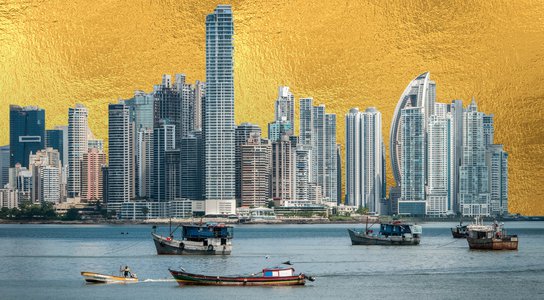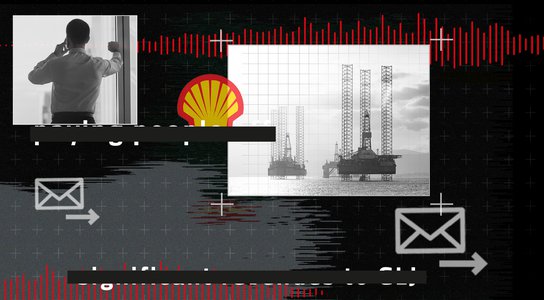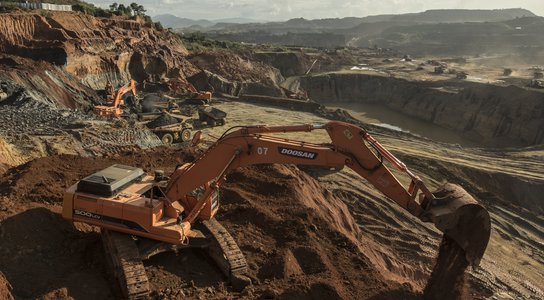This has been another exciting and eventful year in the world of Global Witness with plenty of progress on long-running campaigns, from exposing that oil major Shell knew it was taking part in a vast bribery scheme, to revealing that commodities giant Glencore had used a secret offshore company to pump millions of dollars to a scandal-hit friend of the DRC president. Not to mention welcoming a new EU law on responsible mineral sourcing, a landmark EU agreement setting a new global standard for company ownership transparency and many other advocacy wins.
On the other hand, we are operating in an ever more hostile climate. Civil society and transparency standards are under attack across the world, leading to inevitable frustrations and obstacles. At times, as when Cambodia’s opposition party was dissolved or Honduras launched a smear campaign against Global Witness and other civil society organisations, it’s been downright ugly.
Yet all of this only spurs us on to shine a brighter light on corruption and advocate for greater transparency. Here are just some of the ways we’ve been fighting for system-wide change that will starve corrupt dictators and warlords of looted funds, stop brutal resource-driven conflicts and protect the planet’s natural assets for the benefit of all.
The Good: campaign successes of 2017
Shell Knew, and now they’re going to trial
In April, we forced one of the biggest companies in the world into a U-turn. We’ve been working for 6 years to expose the truth behind Shell and their Italian oil partner Eni’s involvement in the murky deal for Nigeria’s OPL 245 oil block – a deal that robbed the Nigerian people of over $1.1 billion.
This year, we revealed new evidence showing that Shell knew that it was taking part in a vast bribery scheme. Within a day of the story hitting the headlines, Shell admitted for the first time it had known the money it paid was flowing to convicted money launderer Etete all along.
Then just this week in a breakthrough ruling the Italian courts ordered Shell, Eni and 11 top oil executives to stand trial for corruption in the biggest corporate bribery trial in history!
The trial will open next spring, and has the potential to become a watershed moment. It could shift the way that too many in the oil industry have operated with impunity for too long, and finally deliver benefits to the people of Nigeria.
EU work bears fruit
We have an office in Brussels! For the first time we have established a presence in Brussels, allowing us to expand our EU advocacy work across many of our campaigns. While a permanent presence may be new for Global Witness, we’ve been lobbying for change across a number of campaigns within the European Union for many years. This year, much of that work bore fruit.
First, in June 2017, we welcomed a new EU law on responsible mineral sourcing following years of advocacy. The Responsible Sourcing Regulation will, for the first time, require EU importers of four minerals sometimes linked to conflict and human rights abuses around the world, to make sure they know their supply chains and deal effectively with risks that arise along them. In a significant step, the EU has acknowledged the global nature of the problem by making sure it covers imports from all countries, not just the handful that have received the most attention to date. The law has its limitations and as always, last minute loopholes loom over its implementation. However, while work remains, we’ve taken an important step in the right direction.
We also saw our EU campaigning on Environmental, Social and Governance (ESG) investor risk build political momentum. Following concerted advocacy along with our NGO partners, the European Commission has committed to producing an action plan on sustainable finance aimed at preventing the EU finance industry from investing in environmentally and socially damaging projects.
This marks a huge opportunity to prevent European money funding projects which cause human rights violations and environmental destruction around the world.
Then, just last week, the EU agreed on new ground-breaking rules to reveal the true owners of EU companies, through changes to the EU Anti-Money Laundering Directive. These changes were intended to respond to last year’s Panama Papers revelations and while they may have been a long time coming, the EU’s introduction of public registers of beneficial ownership is definitely a game-changer for tackling anonymous companies.
Now, the rest of the world must follow the EU’s lead. We will work to ensure the new transparency rules are implemented by the 28 EU countries and to continue pushing for transparency of trusts, which the EU deal made little progress on.
Progress in the rubber industry
Our longstanding campaign to expose the harms caused by the natural rubber industry in the Mekong and our ongoing engagement and advocacy with companies and industry bodies has seen two important successes in 2017. First of all, in October we helped launch strong new Chinese industry guidelines for the natural rubber sector with our partner the China Chamber of Commerce of Metals, Minerals and Chemicals Importers and Exporters (CCCMC), having worked with them for several years to develop them. We’re now looking ahead to work with Chinese and international rubber producers, processors and purchasers to ensure the guidelines are implemented.
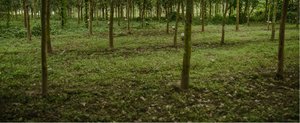
2017 has seen significant progress in tackling potential harms in the rubber industry. © Global Witness
Then, in November, Pirelli, one of the big five tyre companies, launched a new sustainable sourcing policy for natural rubber. This commits the company to “zero land grabbing” and “zero deforestation” and they have also adopted a “no burn” policy and no development on peatland – a major source of greenhouse gases. This is the second of the big five tyre companies, which dominate the rubber industry, to do so and is the culmination of a long and hard fought campaign by Global Witness and partners.
Both the Chinese industry guidelines and the Pirelli policy are significant steps which could help prevent the kinds of human rights abuses and environmental destruction that Global Witness investigations into rubber expansion have helped expose. We are working with a range of stakeholders to help develop an emerging standard for natural rubber supply chains in the new year.
Bipartisan support in U.S. for beneficial ownership transparency
Despite facing a Congress and administration often hostile to transparency - more on that below - we have made progress in generating more diverse and bipartisan support for US beneficial ownership transparency legislation designed to end anonymous companies.
Three bipartisan bills relating to beneficial ownership were introduced, as well as a range of other more specific legislative proposals aiming to tackle aspects of the problems posed by anonymous companies.
In November, we testified in front of the the U.S. House of Representatives’ Committee on Financial Services on the urgent need for beneficial ownership legislation to prevent corrupt officials, drug traffickers and terrorists from hiding behind the secrecy of anonymously-owned companies to move and launder suspicious funds into and out of the U.S.
EITI ramps up reporting requirements for extractive companies
There was a major step forward in the anti-corruption fight as the Extractives Industries Transparency Initiative (EITI), a global transparency scheme, ramped up reporting requirements for oil, gas and mining companies by requiring them to publish their payments to governments, such as taxes and royalties, separately for each oil, gas or mining project they own. Governments, in turn, are required to publish the receipts. The introduction of project-level reporting is a game-changing measure. By bringing payments and receipts out into the open, people in resource-dependent countries can track the money and hold their governments to account for how it’s used.
Guardian partnership on environmental defenders
To coincide with our annual report on the deaths of environmental defenders around the world, in July we launched an exciting new partnership with the Guardian Online, who have created a dedicated space on their site for our data and their stories. Our work with the Guardian has kept up the pressure by tracking the unacceptable deaths of those brave activists who fight to save their homes, livelihoods and land, which so often also protects the environment for us all.
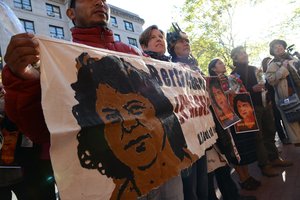
Backers for the Agua Zarca dam in Honduras - which led to the murder of acclaimed land defender Berta Cáceres - withdrew their backing for the project in July. © Daniel Cima / Creative Commons
And there was finally some good news from Honduras, where Berta Cáceres was murdered in her fight against the Agua Zarca dam in 2016. In July, the backers for that project pulled out after relentless campaigning from many groups, including Global Witness. We continue to push for greater accountability from those banks who bankroll such projects.
The findings and recommendations in our Honduras report also led to a strengthening of the Honduras protection mechanism for defendersand a call for a change in US policy in Honduras by almost 80 US legislators. Though as we reveal below, there have been darker moments too.
DRC logging moratorium preserved
DRC’s moratorium on the allocation of new industrial logging concessions remained in place, despite moves to lift it, thanks to pressure from a coalition of Congolese and international NGOs, including Global Witness.
2017 was also the year in which a number of individuals finally met their comeuppance…
Guus van Koewenhoven brought to justice
Notorious timber baron and gunrunner Guus van Koewenhoven, whose involvement in illegal logging and arms trafficking Global Witness exposed back in 2001, was finally brought to justice. Just a few weeks ago, he was arrested in South Africa and is set to be extradited to the Netherlands, where he was convicted earlier this year for aiding and abetting war crimes and illegally trading arms during the height of Liberia’s civil war. The message to those who profit from international crimes? You will be found and you will face the full force of the law.
Teodorin Obiang found guilty by French courts
Another landmark ruling came in October when French courts found Teodorin Obiang, the son of the dictator of oil-rich Equatorial Guinea, guilty on charges of laundering the proceeds of corruption, embezzlement and misuse of public funds. This followed a decade-long campaign in France by civil society organizations, led by Transparency International France and Sherpa.
Global Witness investigations have previously shown how Teodorin Obiang enjoys a luxury lifestyle and multi-million dollar spending sprees, while three quarters of the population live below the poverty line. This verdict is the first time ever that a high-level official has been called to account on corruption related charges whilst still in office and should serve as a warning to kleptocrats that France is no longer a safe haven for their corrupt cash.
Reform of the Myanmar Gemstone Sector Moves Forward
The momentum for reform of Myanmar’s secretive jade sector spurred by our seminal 2015 Jade: Myanmar’s Big State Secret report continued with a 2016 gemstone licensing suspension allowing space for an ongoing multi-stakeholder process to develop a new strategy for the sector.
The Bad: abuse and corruption uncovered in 2017
As well as celebrating lobbying successes in a number of long-running campaigns, we published groundbreaking new investigations including on the illegal timber trade in Peru and Papua New Guinea and diamonds in Zimbabwe and the Central African Republic. And though change can be many years in the making, we’ve already seen governments, companies and individuals sit up and take notice.
Glencore’s secrets exposed and Dan Gertler sanctioned
In November, the Paradise Papers shed fresh light on FTSE 100 commodities trader Glencore’s deals in Democratic Republic of Congo. We’ve been investigating Glencore since 2012 over suspect payments made to Dan Gertler, a billionaire mining magnate and close friend of Congo’s president who has been linked to numerous bribery scandals. The latest leaks showed that Gertler personally negotiated mining licences in favour of Katanga Mining, a company Glencore was in the process of taking over. Glencore provided him with tens of millions of dollars in loans and options, paid through secretive offshore companies, in what appears to have been an ‘incentivisation’ package.
Why does this matter? Kofi Annan’s Africa Progress Panel showed in 2013 that just five suspicious mining deals involving Gertler – a couple of which involved Glencore as well – saw Congo lose out on $1.4bn: that was twice the country’s annual spending on health and education combined.
Glencore and Gertler have denied any wrongdoing in their Congo deals, but this new evidence suggests Glencore’s relationship with Gertler goes much further than previously acknowledged, and raises concerns over possible bribery. It adds fresh weight to our calls for Glencore to face an investigation for bribery and corruption, particularly over its Congo deals.
On 21st December Dan Gertler was sanctioned and
had his assets frozen. This follows 7 years of investigations by Global Witness
into the notorious businessman and close friend of the President for his, and
his partners, dealings in the Democratic Republic of Congo.
The US Government stated that Gertler had “amassed his fortune through hundreds of millions of dollars’ worth of opaque and corrupt mining and oil deals in the Democratic Republic of the Congo (DRC)”.
Not only is Gertler finally being held to account for his role in the loss of billions of dollars to the Congolese people, but pressure is also now mounting on his numerous business partners and Congolese President Joseph Kabila, who continues to unconstitutionally cling to power.
Myanmar’s jade trade fueling conflict
As Myanmar geared up for a second round of national peace talks in May, we released a new film and longform investigation revealing how the jade riches of Kachin State are helping to incentivise and fuel deadly armed conflict. Never before seen footage and interviews revealed the human and environmental costs of the trade, and exposed how hidden military interests are controlling the jade sector and stand to lose out from real reform and a peace process that will necessarily lead to a more equitable management of the country’s natural resources.
The diamond industry continues to falter
We released two investigations revealing how diamonds associated with human rights abuse and other harms are still finding their way onto global markets. In the Central African Republic, we showed how social media is used to facilitate international trade in smuggled diamonds. In Zimbabwe, our investigation revealed mounting evidence of the involvement of the country’s politically partisan security forces in the diamond industry, raising serious concerns that diamonds may be funding human rights abuse. This reinforces the urgent need for companies in diamond supply chains to carry out more and better due diligence, making sure their trade funds livelihoods and development, not conflict and abuses.
Deadliest year ever for environmental defenders
We also released our annual report on the killings of land and environmental defenders that found 2016 to be the deadliest year yet, with 200 deaths globally spread across 24 countries compared to 16 in 2015. As detailed above, our partnership with the Guardian has helped us raise further awareness of the killings in real time and advocate for protection.
Papua New Guinea’s Stained Trade
Following years of research, we revealed for the first time how companies in China are failing to screen out illegal timber, the risks this creates for U.S. companies, and the devastating impacts the trade is having on people in Papua New Guinea – home to one of the largest rainforests on the planet.
Our work - including a targeted policy briefing to the Chinese government - led to a Chinese delegation visiting PNG to better understand risks associated with this trade. Two major companies in the U.S. that came up in our investigations committed to changing their sourcing practices. Nature Home, China’s largest flooring brand, stopped importing the flooring in question into the US through its subsidiary while it reviewed its sourcing policies, and later announced that it would stop buying from illegal land leases in PNG exposed in our investigation.
Peru’s Buyers in Good Faith
Our groundbreaking undercover investigation in Peru has exposed how companies caught in the country’s biggest timbers scandal knew or had reasons to suspect their exports from the Amazon rainforest were illegal. Exporting timber if you “know or could presume” it is illegal is a crime under Peruvian law. The footage we’ve obtained is potentially key evidence in ongoing investigations in the country.
Crucially, this could be the first time that timber exporters in Peru are prosecuted – a sobering sign of the historic impunity in the timber sector. Setting a precedent through the effective investigation and prosecution of some of the most powerful players in the supply chain would send a strong signal that the trade of illegal timber in Peru is no longer tolerated.
Meanwhile, the fight to protect gains already made continues…
Trump and Republicans roll back transparency measures in gift to big oil
2017 has seen a whole host of astonishing moves by the Trump Administration and Congress, backed by the American Petroleum Institute, to attack transparency and anti-corruption efforts. At the beginning of the year we repeatedly raised concerns about the appointment as Secretary of State of Rex Tillerson, the former CEO of ExxonMobil: a company which has a record of engaging in questionable oil deals, and leading attempts to undermine anti-corruption policies, as well as facing allegations of purposefully misleading the public on climate change.
In the same week, the Republican-led U.S. Congress voted to rescind the SEC regulation implementing a little-known but vitally important transparency law, which we have been campaigning on for 20 years. The bipartisan law, known as the Cardin-Lugar anti-corruption provision is designed to stop U.S.-listed extractive companies, including ExxonMobil, Chevron and several Chinese oil majors, striking corrupt deals by requiring them to disclose the details of their payments to governments. In December, all the Republicans (bar one) on the U.S. House Financial Services Committee voted to pass a bill that would repeal the anti-corruption provision. However, this vital transparency measure remains intact but under threat.
In November the U.S. Department of Interior announced that the U.S. would withdraw from implementing the Extractive Industries Transparency Initiative (EITI), a multi-stakeholder global anti-corruption program for the oil, gas and mining sectors. The move was an inevitable result of the insistence of major U.S. oil companies ExxonMobil and Chevron on keeping their U.S. tax payments secret. All of these moves set the U.S. in opposition against a broader global trend toward greater transparency and accountability in how oil, gas and mining revenues are managed.
Uganda’s mining sector threatens people, environment and economy
In June, we published the results of our 18 month investigation exposing endemic corruption and mismanagement in Uganda’s fledgling mining sector. We exposed, in ten detailed case studies, the international companies and crooked officials who are profiting at the expense of the country’s people, environment and economy.
DRC forests under threat
And finally, in the Democratic Republic of Congo, the French development agency is intent on plans to support expansion of industrial logging in DRC and is preparing a third 3rd version of plans which have already been twice rejected. We are continuing to do extensive lobbying work to prevent this.
And so to the ugly…
The year began with a smear campaign in Honduras against both Global Witness and other civil society organisations as we launched our new report into deaths of environmental defenders in the country, the deadliest place in the world for activists. It ended with the suspension of constitutional rights in Honduras and a curfew amidst widespread, mostly peaceful, demonstrations at alleged fraud in the Presidential elections. Farcically, while this was happening the US government certified that Honduras has been fighting corruption and supporting human rights, clearing the way for the government to receive millions of dollars in U.S. aid.
In Europe the Belgium Competent Authority, the Belgian national authority responsible for enforcing EU Timber Regulation (EUTR), has been put on notice by the European Commission for not carrying out enough checks under EUTR. As an important destination for tropical timber from high-risk countries it’s particularly important that Belgian authorities enforce this regulation.
In Cambodia, we have been horrified by the shut-down of civil society, including the closure of the Cambodia Daily - whose final edition was emblazoned with the headline ‘Descent into outright dictatorship’ - and the ‘tragedy’ of the dissolution of the opposition party. We continue to support civil society where we can and call for international sanctions against Cambodia’s corrupt elite.
In Myanmar, a military campaign has led to an unprecedented humanitarian crisis in cr Rakhine State and Bangladesh, and credible claims of ethnic cleansing, while a crackdown on journalists and civil society has raised serious concerns over the commitment of the civilian government to the democratic reform process. .
Meanwhile, we’ve been noting increasing parallels between the actions of the President of the United States and his aides and those of kleptocracies (defined as rule by thieves) like Cambodia, and other countries such as Angola or Equatorial Guinea, where we have been working for years to investigate corruption that benefits those in power, rather than the people they claim to lead.
It seems that each week more revelations come out linking President Trump to corrupt and illegal activity. In November’s Narco-a-Lago: Money Laundering at the Trump Ocean Club, Panama we revealed how Trump made millions from selling his name to a luxury development used to launder money from Latin American drug cartels. While there is no evidence he broke the law, Trump seems to have done little to nothing to prevent this.As is true across the breadth of our work, in shining a light on such murky dealings, we make the case for action even stronger. Since we published, garnering the highest number of views we’ve ever had for an investigation thanks in part to our immersive new longform format, Congressman Jim McGovern has called for further investigation and additional members of Congress have cited our report in their request to the United States Treasury to turn over documents into Trump’s financial dealings with Russia.
Looking ahead to 2018
We’ve got lots of hard-hitting investigations, high profile partnerships and more in the pipeline for next year. So you never miss a thing, sign up for email updates on ourcampaigns
Please also consider making a donation to support our work. Together we can expose the shadow systems that enable corruption and conflict, environmental devastation and human rights abuses - and lift the resource course that condemns millions of people to lives of poverty and violence.
Thanks for your support and interest in our work - and here’s to 2018.
